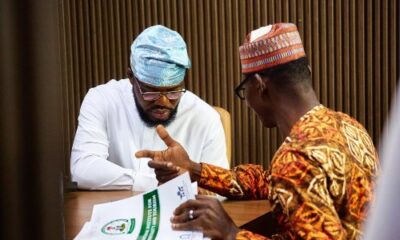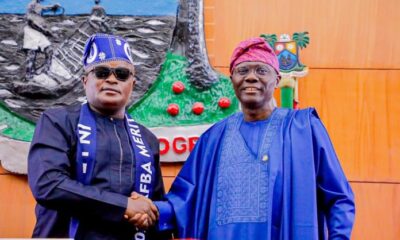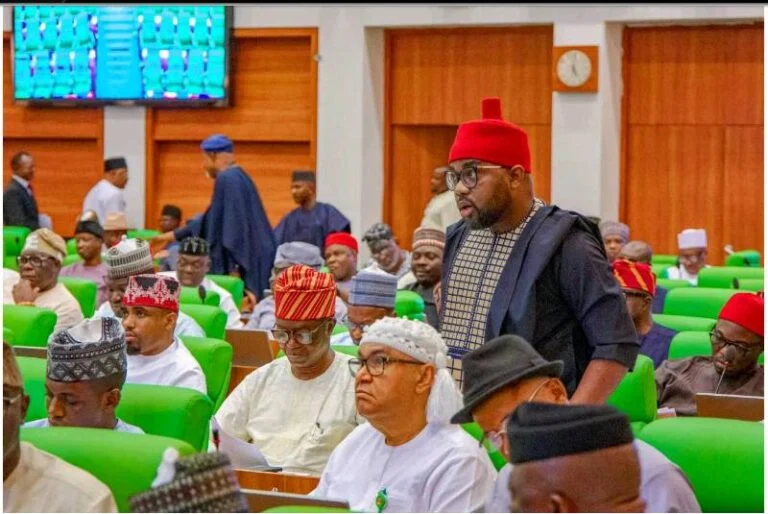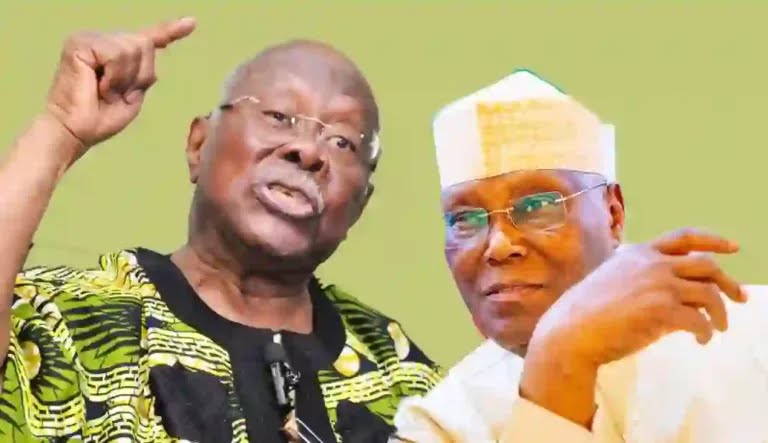The National Deputy President of the Trade Union Congress, Tommy Etim, said nothing would stop the strike, noting that Nigerian workers were disenchanted with the Federal Government.
He stated that the unions had given the government sufficient time to address their demands, stressing that the workers would not allow themselves to be deceived any longer.
Etim on Wednesday said that any fresh meeting was pointless and asked Nigerians to brace for the long-drawn walkout.
‘’The government had been given more than enough time to meet our demands but they did nothing. The strike has been fixed, nothing will stop it, and if they (FG) like, they can go to court as usual. The only thing that can stop the strike is if they meet all our demands,’’ he stated.
Asked what Nigerians should expect during the industrial action, the labour leader added, ‘’It will not just be a total shutdown of the nation, it is going to be the mother of all strikes. Do you know that they are even planning to sack 17,000 workers in this period when Nigerians are suffering great hardships?’’
Also, a top official of the NLC while speaking on the proposed strike, said, “The issues are straightforward, NLC’s joint communiqué was very clear. NLC has declared an indefinite nationwide strike which is to begin on October 3, 2023, and nothing will make us not to start unless the government does everything we have said they should do.’’
Asked if the unions would shelve their plan if invited to a meeting by FG, the union leader noted, ‘’No meeting or promise that would make us stop; the only thing that would make us stop is the fulfilment of all those demands, nothing else.”
Fuel scarcity, blackout
Meanwhile, Nigerians may have to brace for fuel scarcity and nationwide blackout from Tuesday as the Nigeria Union of Petroleum and Natural Gas workers and the National Union of Electricity Employees have vowed to join the indefinite strike declared by the NLC and TUC.
Also, the health workers said that they would not be available to attend to patients at the hospitals while the judiciary staff disclosed that the courts would be shut down nationwide.
Senior officials of NUPENG and NUEE told our correspondent on Wednesday that the unions would ground petrol and electricity supply once the strike begins.
NUPENG’s National President, Williams Akporeha, said the union would implement every instruction issued by the NLC, adding that it was non-negotiable for NUPENG to join the strike.
On Tuesday, the NLC and TUC announced an indefinite strike with effect from October 3, to protest the alleged failure of the Federal Government to provide post-subsidy palliatives for workers and implement policies that could alleviate the sufferings of the masses after the removal of the fuel subsidy.
After the 21-day ultimatum given by the NLC lapsed last week, the National President of the NLC, Joe Ajaero, had lamented that none of the demands put before the government had been addressed.
Responding to a question on whether NUPENG would join the proposed strike, Akporeha said, “We are an affiliate of NLC and we will follow their directives to the letter.”
The NLC has over 40 affiliate unions, while the TUC has about 30 and the affiliates often participate in industrial actions called by the parent associations.
Also confirming the resolve of NUEE to comply with the strike directive, the acting General Secretary of the union, Dominic Igwebuike, said the association would ground power supply if the government fails to avert the proposed walkout.
“NUEE is an affiliate of NLC and we are complying with the directive of the congress by joining the strike from Tuesday. Workers in various electricity companies are our members.
“So, we are ready to join the strike and our circular communicated that to our members. So, electricity workers are right now getting set to join the strike and this will lead to a massive shutdown of the power sector,” he stated.
Igwebuike had earlier said though the power sector employees were regarded as essential workers, they would still join the proposed strike.
He noted, “People in the power sector are also Nigerians. There is no different market for people working in the essential services sectors. We all go to the same markets, pay school fees, buy fuel and face the same challenges. So we are Nigerians too.”
He explained that the September 5 and 6 walkout did not ground all the power stations because it was a warning strike, but stressed that the major strike beginning from October 3 would culminate in a complete shutdown of the country’s electricity grid.
Igwebuike urged the Federal Government to listen to the demands of the labour unions in order to avert the impending hardship that the proposed industrial action would bring upon Nigerians.
Speaking in the same tone, the healthcare workers under the aegis of the Joint Health Sector Unions and the National Association of Nigeria Nurses and Midwives said they will join the planned nationwide strike.
Health workers
The acting National Vice Chairman of JOHESU, Dr Obinna Ogbonna, disclosed this to our correspondent on Wednesday.
Ogbonna said the health workers in the affiliates of the TUC and NLC would not report for work during the strike period.
JOHESU is the umbrella body of health workers’ unions and associations, including the Medical and Health Workers’ Union of Nigeria, the Nigerian Union of Allied Health Professionals, the Non-Academic Staff Union of Universities and Associated Institution, the Senior Staff Association of Universities, Teaching Hospitals and Associated Institutions, and the Assembly of Healthcare Professional Associations.
Ogbonna stated, “We will join the strike fully and strongly because there was a circular released in the month of July 2023, by the National Salaries, Incomes and Wages Commission.
‘’It has to do with the upward review of Consolidated Health Salary Structure and Consolidated Medical Salary Structure and it stated that it will be implemented from June 2023, and the reason why it was so was because of the biting economic situation, but up till this moment, it has not been implemented.
“The palliatives that are meant to be done for us in the health sector have not been done. So, why are we not going to join the strike?”
Ogbonna noted that health services would be paralysed in government-owned facilities.
“We will only render skeletal services, especially to those in the Intensive Care Units,” he said.
Corroborating him, the National President of the NUAHP, Kamal Ibrahim, said the members of his union will also participate in the nationwide strike.
“We will be joining the strike and it is for the good of the people,” he added.
As members of the NLC, the Judiciary Staff Union of Nigeria said its members will join the strike action.
The treasurer of the union, Musa Alonge, argued that the issues the NLC was canvassing affected its members.
He said, “We are an affiliate of the NLC and we cannot deny that. What they are agitating for affects us. We are going where the NLC goes on this matter.”
Meanwhile, the spokesperson of the Ministry of Labour and Employment, Olajide Oshundun, in a statement signed on Wednesday evening addressed reports that the President, Bola Tinubu, would roll out wage awards and palliatives for workers on Independence Day. He said, “For the benefit of doubt, it is important to stress that the Director of Information at the Ministry of Labour does not speak for the President nor is he involved in writing his speech to warrant him making any categorical statement on its content.
“If and when the minister schedules a meeting with Labour, the public will be adequately notified through verified channels.”
In a related development, the leadership of the Labour Party has thrown its weight behind the planned industrial action, saying the Presidency has been insensitive to the plight of Nigerian workers.
Among other things, the NLC and the TUC were asking for wage awards, implementation of palliatives, tax exemptions and allowances to public sector workers and a review of the minimum wage.
Reacting to the proposed strike in a statement titled, ‘Workers strike: Labour Party identifies with Nigerian workers’ on Wednesday, National Publicity Secretary of LP, Obiora Ifoh, said the workers have shown enough patience and understanding.
Ifoh also added that the leadership of the party was in support of any legitimate means to press for better welfare for Nigerian workers.
The party, therefore, said it fully supported the resolution of the NLC and TUC to embark on an industrial action.
He said, “We have followed with keen interest, in the last four months, various meetings between Organised Labour and various government bodies including president of the Senate, the Presidency and the ministers of labour as well as all the efforts made by the Labour leadership to get the government to understand the magnitude of sufferings its policies have thrown Nigerian workers into since the enthronement of this administration.
“We are not in any way surprised at the government’s apparent indifference, insensitivity, intransigence, and recalcitrant posture towards the genuine demands of the Labour bodies because their usurpation of power was not sanctioned by both the workers and generality of Nigerians.
“Nigerians went to the polls with clear conviction of the government they wanted but this was denied them through institutional conspiracy. Today, Nigerian workers are being punished for taking a stand during the February 25 presidential election.
‘’Labour Party is also aware of the sordid conditions which workers, the majority of them being our members, are subjected to, where many go to the office on a Monday and are forced by the prevailing economic challenges to sleep in their offices all through to Friday before returning home.
“We are also using this medium to inform all our members and supporters to stock their homes with their necessary needs ahead of a long-drawn mass action until victory is ascertained. No retreat, no surrender.”
Speaking on the planned strike in an interview on Arise TV on Wednesday, the National President of the TUC, Festus Osifo, asked the President Bola Tinubu-led Federal Government to account for the amount it claimed to have saved from the removal of subsidy on Premium Motor Spirit popularly known as petrol. Osifo said this during an interview on Arise Television.
In July 2023, the government noted that it saved more than N1 trillion following the removal of fuel subsidy.
Tinubu said the revenue saved would be used for the benefit of Nigerians.
“In a little over two months, we have saved over a trillion naira that would have been squandered on the unproductive fuel subsidy which only benefitted smugglers and fraudsters. That money will now be used more directly and more beneficially for you and your families,” Tinubu said.
Osifo explained that since the government announced that N1trn had been saved, there was no reason for the government to continue to obtain loans.
“The President and commander in chief on its own came and said the country has saved N1 trillion. The Federal Government went everywhere to announce that if the subsidy is removed, it’s going to save substantial money.
“And so, we don’t expect them to go everywhere and start borrowing money. They told us they are going to save money. So where is the money that you have saved and how have they deployed this money?,’’ he queried.
Credit: The Punch

 BIG STORY2 days ago
BIG STORY2 days ago
 BIG STORY2 days ago
BIG STORY2 days ago
 BIG STORY2 days ago
BIG STORY2 days ago
 BIG STORY1 day ago
BIG STORY1 day ago
 BIG STORY3 days ago
BIG STORY3 days ago
 BIG STORY2 days ago
BIG STORY2 days ago
 BIG STORY3 days ago
BIG STORY3 days ago
 BIG STORY4 days ago
BIG STORY4 days ago






















